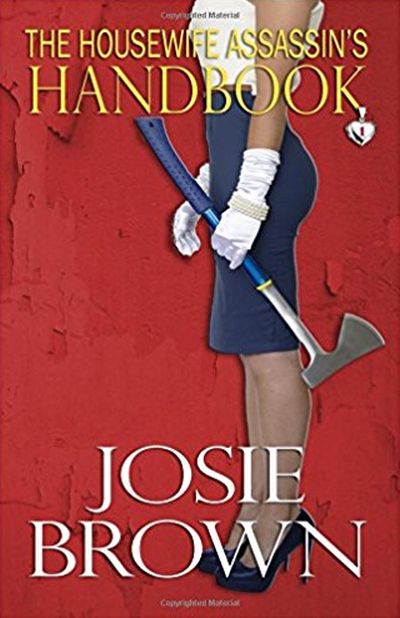 My preferred format for reading is paper; and that’s the only format I support financially, since the only language Big Publishing understands is dollars and cents. Even for a reader like myself, though, e-books have their uses. Writers can offer particular books for free in that format, and that makes it possible to read them first in order to check the quality before you buy the paper edition. And sometimes that opportunity saves you money that would have been wasted if you’d taken a chance on the paper book to begin with! For me, this series opener (which Brown makes available free in e-book format on a permanent basis) was one of those books I was thankful I didn’t have to spend money on, which I’d have regretted.
My preferred format for reading is paper; and that’s the only format I support financially, since the only language Big Publishing understands is dollars and cents. Even for a reader like myself, though, e-books have their uses. Writers can offer particular books for free in that format, and that makes it possible to read them first in order to check the quality before you buy the paper edition. And sometimes that opportunity saves you money that would have been wasted if you’d taken a chance on the paper book to begin with! For me, this series opener (which Brown makes available free in e-book format on a permanent basis) was one of those books I was thankful I didn’t have to spend money on, which I’d have regretted.
The novel’s premise is intriguing enough, and the harrowing first chapter grabbed my attention effectively. We’re plunged into the action right away, with present-day events narrated by protagonist Donna in present tense. At the first opportunity, she drops back into a flashback (in past tense) that gives us an introduction to her childhood and family background –and yes, that’s relevant!– how she met her husband, their few years together, and her discovery, after he was identified as the dead victim of a car wreck on the night she gave birth to their third child, that he had a BIG secret: the corporation he worked for was a front that contracted to do wet work for the CIA, and he was an assassin, most recently assigned to help bring down the Quorum, a shadowy organization of ex-government assassins who’ve gone rogue and are out for profit. (They planted the bomb in his car.) We also learn how, needing to support her kids and wanting to better protect them (long story!), and wanting vengeance on the kinds of scumbags who made her a widow, she subsequently agreed to go to work for Carl’s employer, in his old job. (That’s not as big a stretch as it would be for some women –she learned to shoot as a kid, is naturally talented for and very good at it, and met Carl at a firing range.)
While I was reading the first few chapters, I expected this to be a four-star read. The body of the novel itself (we’ll talk about the italicized chapter beginnings below!) actually is more serious in tone than comedic, although it does have some deadpan humor that arises from the incongruities of Donna’s job responsibilities vs. her domestic ones. Her reflections about the ethics of what she does aren’t approached flippantly, and she’s a well-drawn character who earned my sympathy and respect –a very tough woman, morally and physically, but essentially a good and decent person and a caring mom (who intends to survive and be there for her kids). Brown creates a situation that’s fraught with moral and emotional complexity and shades of gray to start with, and then ups the emotional ante exponentially with a new development –followed by some more really compelling twists and turns, the first one of which I didn’t see coming. (I did suspect the second one.) None of the other characters are developed as fully as Donna, but they’re believable, and the author does conjure a sense of place with the southern California setting (in Orange County). And I liked the depiction of family life, and Donna’s relationship with her kids.
In fairness, I also need to defend Donna against the complaint of one reviewer, who regards her as a moral pariah because she lies to her kids, at a very serious level. Well, yes, she does (although she doesn’t like that situation). But as a reality check, these kids are 12, 10 and 5 years old, with big mouths, limited impulse control, and a child’s immaturity and deficient understanding of danger and the complexities of real-world situations. Even if the lies involved are extreme, telling them the truth in a life-and-death situation, where things they do and say could have disastrous consequences, is not a course I’d advocate.
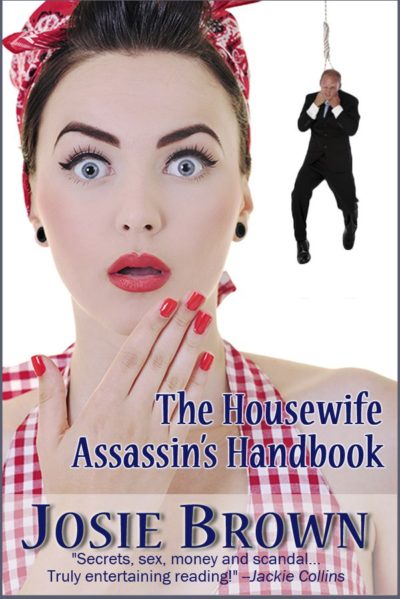 The principal problem I had here was that the plotting is simply not well thought out, and not convincing. One could argue that the essential premise is far-fetched; but I was okay with suspending disbelief that far. (Whether or not black ops organizations would hire a single mom with kids is a matter of speculation, since real life organizations like this don’t publicize their personnel policies. :-) ) But even within the premise Brown creates, much of her plotting simply doesn’t stand examination. Some of the major actions by the villain(s) are at cross-purposes with some of their other major actions; several events that take place here would involve the police in the story, at a level that couldn’t be ignored, but there’s no indication of that here; Donna’s reasoning for one major decision is weak and unconvincing; and Acme (the company she works for) would be much more actively involved in the decision-making at the end, not passive as it is here. Also, characters could not realistically suddenly just shrug off previously incapacitating wounds (which happens here twice), and there are other significant logical slips that took me out of the story. The author writes prolifically, but she apparently wrote this novel too quickly to take her craftsmanship in plotting seriously, or to put any real thought behind it. (That’s a real shame.)
The principal problem I had here was that the plotting is simply not well thought out, and not convincing. One could argue that the essential premise is far-fetched; but I was okay with suspending disbelief that far. (Whether or not black ops organizations would hire a single mom with kids is a matter of speculation, since real life organizations like this don’t publicize their personnel policies. :-) ) But even within the premise Brown creates, much of her plotting simply doesn’t stand examination. Some of the major actions by the villain(s) are at cross-purposes with some of their other major actions; several events that take place here would involve the police in the story, at a level that couldn’t be ignored, but there’s no indication of that here; Donna’s reasoning for one major decision is weak and unconvincing; and Acme (the company she works for) would be much more actively involved in the decision-making at the end, not passive as it is here. Also, characters could not realistically suddenly just shrug off previously incapacitating wounds (which happens here twice), and there are other significant logical slips that took me out of the story. The author writes prolifically, but she apparently wrote this novel too quickly to take her craftsmanship in plotting seriously, or to put any real thought behind it. (That’s a real shame.)
Finally, a word is in order about the titular “Handbook” aspect. As a gimmick here (and as nearly as I can tell, in the other 15 books of the series as well, though I haven’t read them) Brown prefaces each chapter with short, italicized snippets giving supposed household hints that blend home economics with mayhem. These are unrelated to the story-line (though some may have a passing thematic connection to something in the chapter), don’t advance it in any way, and don’t reflect any things that Donna might actually do. Instead, they’re intended to be humorous (often depending for their humor on exaggerations that are completely over the top). Some readers like these (one reviewer found them to be her favorite aspect of the book!); so as the saying goes, “Your mileage may vary.” Personally, though, their humor generally fell flat for me; it typically strains too hard, and comes across as weak (or nonexistent) and forced. I found them an irritating nuisance that the book would have been better off without. Good fiction doesn’t need gimmicks to appeal; and if the author had given us a tight, plausible, well-constructed plot, this novel wouldn’t have needed any gimmick either.
Ultimately, I gave this two stars rather than one, in consideration of its positive elements; and I did finish it (I had to see how it ended!). But I don’t plan to continue reading the series.
Note: The book includes several episodes of explicit sex –including one that’s very abusive and disgusting, although there’s a defensible literary reason for describing it– and other sexual situations (in the opening scene, Donna’s posing as a prostitute). There’s also some bad language, including the f-word (though in Donna’s vocabulary, the latter is only a verb used in unloving contexts, not an all-purpose adjective/adverb) and in the sexual scenes, vulgar terms for some body parts. Most of the other bad language here is strictly of the d- or h-word sort.
Author: Josie Brown
Publisher: Signal Press, available through Amazon, both for Kindle and as a printed book.
A version of this review previously appeared on Goodreads.
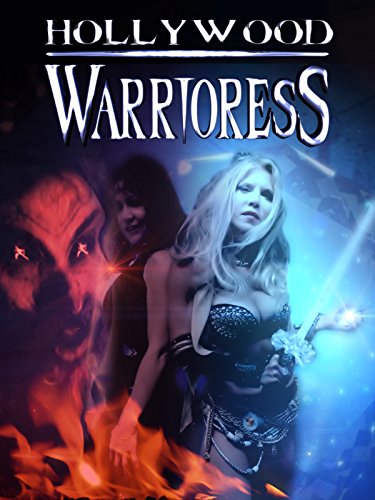 The IMDb says this is a 2016 movie. The copyright in the end credits says 2014. But shooting was apparently going on for this at least as far back as 2011, according to Internet reports. I suspect a lengthy production, shot on weekends, when the participants have some spare time, which may well explain the presence of five credited directors and eight cinematographers. Which in turns helps explains the wretched awfulness of this. Clearly a passion project for Dutch, who is its star, (one-fifth) director, (one-third) writer and executive producer, this proves that passion by itself is not sufficient.
The IMDb says this is a 2016 movie. The copyright in the end credits says 2014. But shooting was apparently going on for this at least as far back as 2011, according to Internet reports. I suspect a lengthy production, shot on weekends, when the participants have some spare time, which may well explain the presence of five credited directors and eight cinematographers. Which in turns helps explains the wretched awfulness of this. Clearly a passion project for Dutch, who is its star, (one-fifth) director, (one-third) writer and executive producer, this proves that passion by itself is not sufficient.




 The leader of all-girl biker gang the Hellcats is brutally beaten and murdered, by Repo (Kosobucki). Her replacement, Kat (Neeld), tries to get to the bottom of the killing, and take vengeance on the perpetrators. Complicating matters is Repo’s position in the Vipers, another motorcycle club with whom the Hellcats have previously had generally friendly relations. Part of that is due to Kat’s on-again, off-again relationship with their leader, Snake (Kabasinski); he also has the advantage of being cosy with some of the local cops, who divert confiscated drugs back to the Vipers for resale. But was he aware of – or did Snake perhaps even order? – Repo’s actions?
The leader of all-girl biker gang the Hellcats is brutally beaten and murdered, by Repo (Kosobucki). Her replacement, Kat (Neeld), tries to get to the bottom of the killing, and take vengeance on the perpetrators. Complicating matters is Repo’s position in the Vipers, another motorcycle club with whom the Hellcats have previously had generally friendly relations. Part of that is due to Kat’s on-again, off-again relationship with their leader, Snake (Kabasinski); he also has the advantage of being cosy with some of the local cops, who divert confiscated drugs back to the Vipers for resale. But was he aware of – or did Snake perhaps even order? – Repo’s actions? McCarthy appears to be Feig’s muse, having starred in his last four movies, from Bridesmaids through this, and then on to
McCarthy appears to be Feig’s muse, having starred in his last four movies, from Bridesmaids through this, and then on to  Actually, that’s unfair. For this was released in its home country of South Africa in March 2017, six months
Actually, that’s unfair. For this was released in its home country of South Africa in March 2017, six months  Nora (Carrere) and her two American friends cross the border to Tijuana for a weekend of partying. It doesn’t quite go as expected: the trio instead end up locked up in a Mexican police-station. When two cops on guard at the jail attempt to rape one of her pals, Nora grabs a gun and shoots them both dead. While this perhaps does solve the immediate problem, it obviously creates some rather heftier issues. The three women go on the run, assisted by another inmate, Juan Delgado (Gómez), who has the local knowledge they need to survive south of the border. It turns out Juan was just about to sneak across the American border, and he agrees that if they will fund the payment to the coyotes for him and his family, they can come too.
Nora (Carrere) and her two American friends cross the border to Tijuana for a weekend of partying. It doesn’t quite go as expected: the trio instead end up locked up in a Mexican police-station. When two cops on guard at the jail attempt to rape one of her pals, Nora grabs a gun and shoots them both dead. While this perhaps does solve the immediate problem, it obviously creates some rather heftier issues. The three women go on the run, assisted by another inmate, Juan Delgado (Gómez), who has the local knowledge they need to survive south of the border. It turns out Juan was just about to sneak across the American border, and he agrees that if they will fund the payment to the coyotes for him and his family, they can come too. My preferred format for reading is paper; and that’s the only format I support financially, since the only language Big Publishing understands is dollars and cents. Even for a reader like myself, though, e-books have their uses. Writers can offer particular books for free in that format, and that makes it possible to read them first in order to check the quality before you buy the paper edition. And sometimes that opportunity saves you money that would have been wasted if you’d taken a chance on the paper book to begin with! For me, this series opener (which Brown makes available free in e-book format on a permanent basis) was one of those books I was thankful I didn’t have to spend money on, which I’d have regretted.
My preferred format for reading is paper; and that’s the only format I support financially, since the only language Big Publishing understands is dollars and cents. Even for a reader like myself, though, e-books have their uses. Writers can offer particular books for free in that format, and that makes it possible to read them first in order to check the quality before you buy the paper edition. And sometimes that opportunity saves you money that would have been wasted if you’d taken a chance on the paper book to begin with! For me, this series opener (which Brown makes available free in e-book format on a permanent basis) was one of those books I was thankful I didn’t have to spend money on, which I’d have regretted. The principal problem I had here was that the plotting is simply not well thought out, and not convincing. One could argue that the essential premise is far-fetched; but I was okay with suspending disbelief that far. (Whether or not black ops organizations would hire a single mom with kids is a matter of speculation, since real life organizations like this don’t publicize their personnel policies. :-) ) But even within the premise Brown creates, much of her plotting simply doesn’t stand examination. Some of the major actions by the villain(s) are at cross-purposes with some of their other major actions; several events that take place here would involve the police in the story, at a level that couldn’t be ignored, but there’s no indication of that here; Donna’s reasoning for one major decision is weak and unconvincing; and Acme (the company she works for) would be much more actively involved in the decision-making at the end, not passive as it is here. Also, characters could not realistically suddenly just shrug off previously incapacitating wounds (which happens here twice), and there are other significant logical slips that took me out of the story. The author writes prolifically, but she apparently wrote this novel too quickly to take her craftsmanship in plotting seriously, or to put any real thought behind it. (That’s a real shame.)
The principal problem I had here was that the plotting is simply not well thought out, and not convincing. One could argue that the essential premise is far-fetched; but I was okay with suspending disbelief that far. (Whether or not black ops organizations would hire a single mom with kids is a matter of speculation, since real life organizations like this don’t publicize their personnel policies. :-) ) But even within the premise Brown creates, much of her plotting simply doesn’t stand examination. Some of the major actions by the villain(s) are at cross-purposes with some of their other major actions; several events that take place here would involve the police in the story, at a level that couldn’t be ignored, but there’s no indication of that here; Donna’s reasoning for one major decision is weak and unconvincing; and Acme (the company she works for) would be much more actively involved in the decision-making at the end, not passive as it is here. Also, characters could not realistically suddenly just shrug off previously incapacitating wounds (which happens here twice), and there are other significant logical slips that took me out of the story. The author writes prolifically, but she apparently wrote this novel too quickly to take her craftsmanship in plotting seriously, or to put any real thought behind it. (That’s a real shame.) An interesting premise gets wasted, buried under a muddied writing style which sets up in one direction, then abandons it for another. Orphan Kalinda has been brought up by The Sisterhood in their remote temple in the mountains (kinda Indian, kinda Sumerian, annoyingly non-specific), training in the ways of a warrior – though others have far more talent in the era. Her life is upended when the local monarch, Tarek, visits the temple and selects Kalinda to be his next wife. Next, as in he already has 99, not to mention his additional courtesans. The problem for Kalinda is, this sets up a tournament in which she can be challenged by the other women, who seek to supplant her.
An interesting premise gets wasted, buried under a muddied writing style which sets up in one direction, then abandons it for another. Orphan Kalinda has been brought up by The Sisterhood in their remote temple in the mountains (kinda Indian, kinda Sumerian, annoyingly non-specific), training in the ways of a warrior – though others have far more talent in the era. Her life is upended when the local monarch, Tarek, visits the temple and selects Kalinda to be his next wife. Next, as in he already has 99, not to mention his additional courtesans. The problem for Kalinda is, this sets up a tournament in which she can be challenged by the other women, who seek to supplant her. A viral plague has decimated mankind, turning its victims in mindless, flesh-craving ghouls. One of the few to have survived is Ann (Walters), who has taken up residence in the woods, where she has camped out. Ann uses the survival skills she received from her now-absent husband, Jason (West), only occasionally having to emerge and risk the threat of the infected, in order to gather supplies. Her secluded, yet relatively safe existence is disturbed, when she finds an injured man, Chris (Thompson) and his teenage daughter, Liv (Piersanti) on a road. They are supposed to be on their way north, to where the epidemic is reported to be in check. Yet Chris, in particular, seems curiously unwilling to be on his way.
A viral plague has decimated mankind, turning its victims in mindless, flesh-craving ghouls. One of the few to have survived is Ann (Walters), who has taken up residence in the woods, where she has camped out. Ann uses the survival skills she received from her now-absent husband, Jason (West), only occasionally having to emerge and risk the threat of the infected, in order to gather supplies. Her secluded, yet relatively safe existence is disturbed, when she finds an injured man, Chris (Thompson) and his teenage daughter, Liv (Piersanti) on a road. They are supposed to be on their way north, to where the epidemic is reported to be in check. Yet Chris, in particular, seems curiously unwilling to be on his way.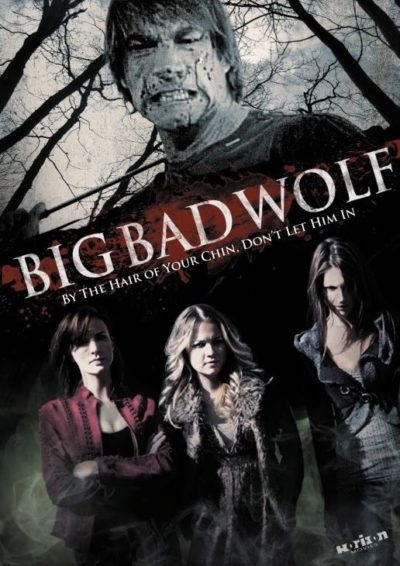 A modern-day update of The Three Little Pigs, this works better than you might think. The wolf is “Huff” (O’Connell), a really warped individual whose interests appear to be religion, drugs and molesting his three step-daughters. Bit of an odd combination. Their mother, Lorelei (Elina Madison), is a largely absent stripper, who seems not to care too much that her boyfriend’s attention have now turned from her oldest daughter, Brixi (Bollinger), to the youngest one, Shay (Stefanko). But when Huff prepares his big score, using cash “borrowed” from his mistress’s ex-husband (or something like that – the relationships here are so complicated, you need a chart to keep track), Lorelei sees her opportunity, sending the three girls away with the money. That leaves Huff in serious trouble, and he’s soon after them, intent on retrieving the cash. Huff is indeed going to puff… on his asthma inhaler.
A modern-day update of The Three Little Pigs, this works better than you might think. The wolf is “Huff” (O’Connell), a really warped individual whose interests appear to be religion, drugs and molesting his three step-daughters. Bit of an odd combination. Their mother, Lorelei (Elina Madison), is a largely absent stripper, who seems not to care too much that her boyfriend’s attention have now turned from her oldest daughter, Brixi (Bollinger), to the youngest one, Shay (Stefanko). But when Huff prepares his big score, using cash “borrowed” from his mistress’s ex-husband (or something like that – the relationships here are so complicated, you need a chart to keep track), Lorelei sees her opportunity, sending the three girls away with the money. That leaves Huff in serious trouble, and he’s soon after them, intent on retrieving the cash. Huff is indeed going to puff… on his asthma inhaler.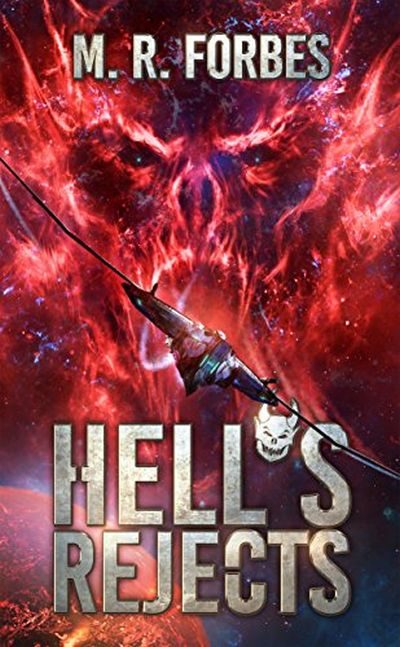 The heroine in this enjoyable slice of space opera is Lieutenant Abigail Cage. She’s a “breaker” – effectively, a hacker – although one who is highly trained in combat. Her latest mission is to enter a rebel compound and recover a laptop, but the job goes awry, and she finds herself framed for treason after a cache of weapons goes mission, and sent to Hell. No, literally: that’s the name of the planet, and it’s an entirely apt one.
The heroine in this enjoyable slice of space opera is Lieutenant Abigail Cage. She’s a “breaker” – effectively, a hacker – although one who is highly trained in combat. Her latest mission is to enter a rebel compound and recover a laptop, but the job goes awry, and she finds herself framed for treason after a cache of weapons goes mission, and sent to Hell. No, literally: that’s the name of the planet, and it’s an entirely apt one.